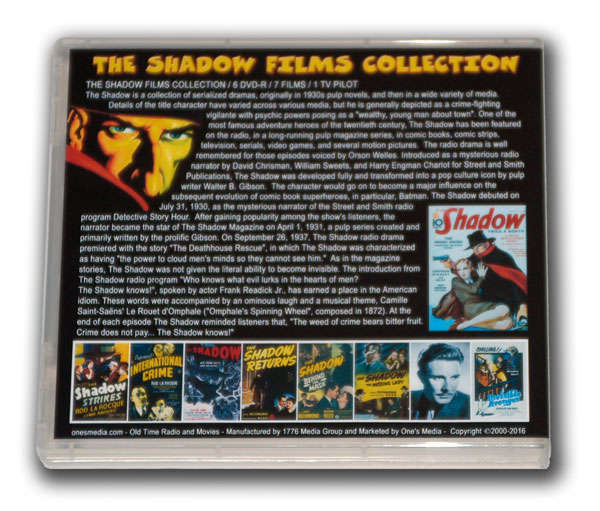6 DVD-R - 8 MOVIES - 1937-1958
The Shadow is a collection of serialized dramas, originally in 1930s pulp novels, and then in a wide variety of media. Details of the title character have varied across various media, but he is generally depicted as a crime-fighting vigilante with psychic powers posing as a "wealthy, young man about town". One of the most famous adventure heroes of the twentieth century, The Shadow has been featured on the radio, in a long-running pulp magazine series, in comic books, comic strips, television, serials, video games, and at least five motion pictures. The radio drama is well-remembered for those episodes voiced by Orson Welles.
Introduced as a mysterious radio narrator by David Chrisman, William Sweets, and Harry Engman Charlot for Street and Smith Publications, The Shadow was developed fully and transformed into a pop culture icon by pulp writer Walter B. Gibson. The character would go on to become a major influence on the subsequent evolution of comic book superheroes, in particular, Batman.
The Shadow debuted on July 31, 1930, as the mysterious narrator of the Street and Smith radio program Detective Story Hour.[4] After gaining popularity among the show's listeners, the narrator became the star of The Shadow Magazine on April 1, 1931, a pulp series created and primarily written by the prolific Gibson.
On September 26, 1937, The Shadow radio drama premiered with the story "The Deathhouse Rescue", in which The Shadow was characterized as having "the power to cloud men's minds so they cannot see him." As in the magazine stories, The Shadow was not given the literal ability to become invisible.
The introduction from The Shadow radio program "Who knows what evil lurks in the hearts of men? The Shadow knows!", spoken by actor Frank Readick Jr., has earned a place in the American idiom. These words were accompanied by an ominous laugh and a musical theme, Camille Saint-Saëns' Le Rouet d'Omphale ("Omphale's Spinning Wheel", composed in 1872). At the end of each episode The Shadow reminded listeners that, "The weed of crime bears bitter fruit. Crime does not pay... The Shadow knows!"
MOVIES LIST:
The Shadow Strikes (1937)
International Crime (1938)
The Shadow Serial (1940)
The Shadow Returns (1946)
Behind the Mask (1946)
The Missing Lady (1946)
The Shadow TV Pilot (1954)
Invisible Avenger (1958)
 The Shadow Strikes (1937)
The Shadow Strikes (1937)
The film The Shadow Strikes was released in 1937, starring Rod La Rocque in the title role. Lamont Cranston assumes the secret identity of "The Shadow" in order to thwart an attempted robbery at an attorney's office. Both The Shadow Strikes (1937) and its sequel, International Crime (1938), were released by Grand National Pictures.
International Crime (1938)
La Rocque returned the following year in International Crime. In this version, reporter Lamont Cranston is an amateur criminologist and detective who uses the name of "The Shadow" as a radio gimmick. Thomas Jackson portrayed Police Commissioner Weston, and Astrid Allwyn was cast as Phoebe Lane, Cranston's assistant.
The Shadow (1940)
The Shadow, a 15-chapter movie serial produced by Columbia Pictures and starring Victor Jory, premiered in theaters in 1940. The serial's villain, The Black Tiger, is a criminal mastermind who sabotages rail lines and factories across the United States. Lamont Cranston must become his shadowy alter ego in order to unmask the criminal and halt his fiendish crime spree. As The Shadow, Jory wears an all-black suit and cape, as well as a black bandana that helps conceal his facial features.
The Shadow Returns (1946)
Low-budget motion picture studio Monogram Pictures produced a trio of quickie Shadow B-movie features in 1946 starring Kane Richmond: The Shadow Returns, Behind the Mask and The Missing Lady. Richmond's Shadow wore all black, including a trench coat, a wide-brimmed fedora, and a full face-mask similar to the type worn by movie serial hero The Masked Marvel, instead of the character's signature black cape with red lining and red scarf.
Invisible Avenger (1958)
Episodes of a television pilot shot in 1957 were edited into the 1958 theatrical feature Invisible Avenger, rereleased in 1962 as Bourbon Street Shadows.

These films were originally produced long before the advent of High Definition TV, therefore they are best viewed on a small screen. HD TVs tend to stretch and skew the picture. Set your HD TV on 4:3 aspect ratio. (That was the old TV format). Please do not expect DVD or Commercial level DVDs from these films. Email us for any additional info.
CLICK HERE TO LEARN MORE ABOUT OUR PRODUCTS
We guarantee delivery of your item. If your item doesn't get there or is damaged, please notify us and we'll reship for you. FULL REFUND IF NOT SATISFIED
